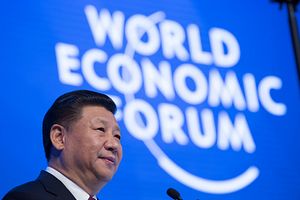One of Chinese President Xi Jinping signature concepts for China’s foreign policy is to build “a community of shared future for mankind.” Recently, that specific slogan was written into United Nations security resolutions for the first time. While hardly any foreign media even noticed the UN’s short citation, in Beijing’s eyes, it was a big victory for Chinese diplomacy as well as for Xi himself.
The First Committee of Disarmament and International Security of the 72nd Session of the UN General Assembly concluded on November 2 and approved two draft resolutions on the prevention of an arms race in outer space: “No first placement of weapons in outer space” and “Further practical measures for the prevention of an arms race in outer space.” Both resolutions adopted the idea of shaping “a community of shared future for mankind [or humankind]” — the exact words emphasized by Xi at multiple important events since he came into office.
In the UN resolution of “No first placement of weapons in outer space,” for example, the General Assembly reaffirmed that “practical measures should be examined and taken in the search for agreements to prevent an arms race in outer space in a common effort towards a community of shared future for humankind.”
While few foreign press or Chinese observers noted the development, the news has been widely reported in China’s national media and specially mentioned by the Chinese foreign ministry during its regular news briefing.
On October 3, ministry spokesperson Hua Chunying made an unusually lengthy comment on the UN adoption. She said:
This has filled in a blank in the field of international security at the UN, which shows that the concept of a community of shared future for mankind reflects the shared aspiration of most countries and serves the common interests of the international community. It also demonstrates that China’s idea has gained growing support globally and been increasingly echoed in the UN agenda. I believe this also showcases China’s responsibility as a major country.
In an attempt to demonstrate that the concept has been broadly accepted by the international community, Hua also fully quoted the compliments of several non-Chinese UN officials.
Building “a community of shared future for mankind” and “new type of international relations with win-win cooperation” are the two pillars of Xi’s vision for China’s foreign policy. Compared to the idea of “new type of international relations,” which seemingly failed to strike a chord with the majority in the international community — particularly with the United States — the concept of “a community of shared future for mankind” sounds more harmonious and benign.
In March 2013, Xi proposed the idea in an international arena for the first time at the Moscow State Institute of International Relations. In January 2017, Xi reiterated the idea again in his speech to the World Economic Forum at Davos. As economic globalization and even general internationalization have been under attack since the newly elected U.S. President Donald Trump came into office, Xi’s speech won him high credits at home and abroad.
During the 19th National Congress of the Communist Party of China (CPC), Xi particularly reaffirmed the concept in his three-and-a-half hour long work report, which elevated the concept to a strategic level for China’s future diplomacy.
After Xi’s speech, Chinese Foreign Minister Wang Yi explained the essence of the strategy in a clearer way. Wang said:
To make new and greater contributions for mankind is our Party’s abiding mission…This is an important distinction between the CPC and political parties of other countries, as well as an international image the CPC has fostered… the construction of a new type of international relations, and the building of a community with a shared future for mankind make it necessary for China to make practical efforts and set an example, as well as unswervingly pursue a road to a great nation which is different from that of traditional powers. This is not only the historical duty that China, as a big socialist country, should undertake for the development of human society, but also the historical mission that the Chinese Communists should advance for the progress of human political civilization.
Getting rid of his political jargon, what Wang actually said is that the CPC aims to set an example to the world, proving that its unique model, different from that of those traditional Western powers, can lead humankind, too.
The recent UN incorporation of Xi’s short phase in its resolutions is a big step for China to achieve this ultimate goal.

































